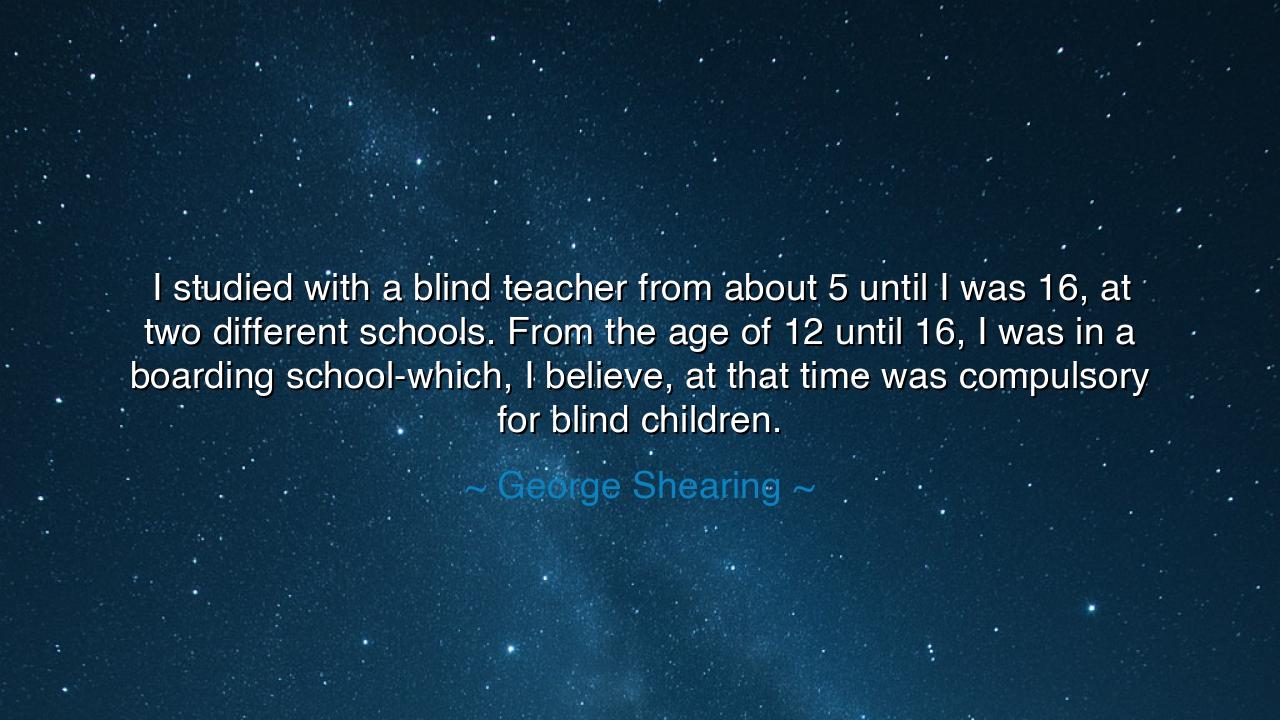
I studied with a blind teacher from about 5 until I was 16, at
I studied with a blind teacher from about 5 until I was 16, at two different schools. From the age of 12 until 16, I was in a boarding school-which, I believe, at that time was compulsory for blind children.






“I studied with a blind teacher from about 5 until I was 16, at two different schools. From the age of 12 until 16, I was in a boarding school—which, I believe, at that time was compulsory for blind children.” Thus spoke George Shearing, the great jazz pianist, who rose from obscurity to become a master of harmony and improvisation. His words, though humble, reveal the profound journey of a soul shaped by both limitation and discipline, by the guidance of a teacher who shared his condition and yet opened to him a world without boundaries.
The meaning of these words is rich in depth. To study with a blind teacher is more than a simple fact; it is a parable of resilience. For the child who could not see was shown the path by another who also lived in darkness, yet refused to let that darkness be a prison. In that classroom, young Shearing learned more than music—he learned that the human spirit is not bound by the eyes, but by the will. The teacher became proof that blindness could be transformed from burden into wisdom, from limitation into art.
From the ages of 5 until 16, Shearing was formed by this unique mentorship. The long years of discipline, of learning without sight, reveal to us that greatness is not a gift bestowed in a moment, but the slow and patient fruit of training. And when at 12 he entered a boarding school for the blind, he was placed in a community of others who shared his struggle. Though compulsory, this schooling was a crucible of resilience. It taught him not only skill but fellowship, the shared strength of those who endure together what might overwhelm the individual alone.
History shows us many who, like Shearing, turned what seemed a limitation into brilliance. Consider Helen Keller, both blind and deaf, who under the guidance of Anne Sullivan discovered the gift of language and became a voice of hope for millions. Or recall Milton, the poet who lost his sight and yet wrote Paradise Lost, dictating lines of immortal verse. These stories, like Shearing’s, reveal that hardship can refine rather than destroy, and that the teacher who has walked the same road becomes the most powerful guide for those who follow.
The origin of Shearing’s words lies not merely in biography but in gratitude. He acknowledges that his journey into music and beyond was shaped by those early years, by the blind teacher who recognized in him not what he lacked but what he could become. And so, in his memory, there is honor: honor for the unseen figures who labor in obscurity, training children in ways that may one day shape the future of art, science, or leadership. His quote is an offering of respect to those mentors whose strength becomes the foundation for another’s triumph.
The lesson is clear: let us never scorn the power of guidance, nor dismiss the potential of those who seem limited. For it is often the one who suffers that carries the deepest wisdom, and the one who teaches from weakness who imparts the strongest courage. The blind teacher gave Shearing more than technique—he gave him a vision of possibility, a faith that music could become his world even if light never could.
Therefore, dear listener, take inspiration from these words. If you are guided, be grateful and faithful to the lessons given to you. If you are a guide, know that your influence may outlive you in ways you cannot imagine. And if you struggle, remember that struggle itself can become the soil of greatness. For Shearing, once a boy in a boarding school for the blind, grew to dazzle the world with melodies full of light. And so too may each of us, if we embrace our hardships as training, and seek in others both guidance and strength.
Thus the voice of George Shearing teaches us this eternal truth: that even in darkness, with the help of teachers and the fire of persistence, one can create beauty that illuminates the world.






AAdministratorAdministrator
Welcome, honored guests. Please leave a comment, we will respond soon